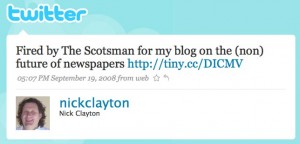This is the fourth post in a series from an anonymous UK-based journalist recently made redundant. To follow the series, you can subscribe to this feed.
Last week I blogged about whether you should apply for subbing jobs if you’re a reporter or a features writer.
This week I’ve spoken to two journalists – one print and one online – about the ‘concertina effect,’ i.e. whether subbing and reporting roles are merging into one, particularly in an online environment.
Peter Sands is a veteran newspaper sub and director of PA Training and insists that the standalone sub is far from dead.
Even with web publishing where content goes live before it is subbed (meaning the reporter has to ensure copy is clean first), Sands says the role of the sub-editor is still vital.
“I would definitely say that you have to have a second pair of eyeballs,” he says.
Sands was editor of the Northern Echo in the early 1990s and admits much has changed since then.
At that time there was real animosity between subs and reporters: “In Darlington there was the Red Lion pub for subs and the Britannia for reporters and never the two should meet,” he says.
While Sands believes the sub is alive and kicking, he acknowledges that their role is being redefined. “The divide [between reporters and subs] has really gone now,” he says.
Sub, web editor and corporate blogger Fiona Cullinan agrees: “Divide? What divide? The divide is less about reporting versus subbing and more about are you engaged or not, are you digitally included or not?”
“By not engaging more in online environments, traditional journalists are not developing their digital writing or subbing skills, let alone all the other skills that go with publishing to the web, like picture research under Creative Commons licences, image manipulation, linking skills, SEO knowledge, how to upload and promote content, and the big one: the ability to deal with readers talking back to you.”
Apart from the odd typo creeping in when you publish first and hone later, many reporters who write straight to the web can face serious libel issues.
Cullinan says checking factual inaccuracies and avoiding legal pitfalls is ‘perfect sub-editor territory‘.
“From what I’ve read, reporters in multimedia newsrooms are being asked to sub their own work; meanwhile subs are being made redundant,” she adds.
“How reporters are supposed to sub to old-school standards, perhaps with minimal experience or training, and 24-hour newsroom deadline pressures, should be interesting!”
Cullinan also points out that the comments section can act as a ‘rather more public second set of eyes, pointing out your typos and incorrect facts’.
The upshot? To keep up with the changing face of journalism a reporter needs to be savvy about subbing as well as having other web skills, but it is still the sub-editor who has the last word.
